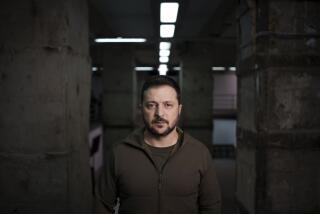Economic Program Needs Revision, Yeltsin Concedes
- Share via
MOSCOW — Russian Federation President Boris N. Yeltsin, just back from stumping Russia to assess the effect of his 2-week-old price reforms, acknowledged Thursday that his economic program needs revision. But he praised his people’s optimism in the face of what appears to be “a truly hopeless situation.”
In visits to five Russian cities over the last week, Yeltsin said he is convinced that decisive measures to destroy monopolies, revamp financial policy, implement land reform and privatize state-owned enterprises must be taken, if his economic reforms are to succeed.
“The first weeks of the reforms showed that a number of corrections already must be made,” he said in a nationally televised speech before the Supreme Soviet, Russia’s legislature.
In a drastic move to jump-start the republic’s economy and put it on the road toward a free-market system, Yeltsin lifted price controls on most goods Jan. 2. Since then, prices have skyrocketed, putting even staple goods out of reach for many Russians.
Yeltsin admitted that the positive effects of his economic shock therapy have not yet been felt, because local officials are implementing the reforms erratically and because producers are hoarding their products, waiting for prices to go up even higher.
“So far, the reform proceeds at an impermissibly slow pace,” he said. “Local authorities continue to wait for precise instructions from above, and when these finally come, they make no haste to implement them.”
Further, he said, “Mafia structures seeking to perpetuate their domination of the consumer goods distribution network, open sabotage and ideological confrontation with the former party officials”--all legacies of the corrupt, former Soviet economy--also clog the reforms.
After decades of central planning, subsidies and artificially controlled prices, the Russian economy is in worse shape than anyone predicted even weeks ago, Yeltsin said, noting: “All of us know that Russia’s national economy had been organized on principles directly contradicting common sense, but only in these days have we seen how sick the economy is . . . and what a burden we have inherited.”
Illustrating the extent of the crisis, Yeltsin said that Russia’s gold reserves have shrunk from 2,300 tons to “a mere 230 tons” over the last three years.
After meeting more well-wishers than hecklers on his visits to several Russian cities, Yeltsin was confident that he still holds the support of the people, despite the painful policies he has imposed.
“I have had one more opportunity to see for myself how difficult it is to feed a family, to raise children, and how hard a pensioner’s lot is,” he said. “But the people do not lose hope. They retain their faith in the Supreme Soviet, in their president and the government. They do not despair. There is an understanding that patience is required, that certain sacrifices have to be made.”
Yeltsin lashed out at saboteurs, swindlers and old-style factory directors who are trying to profit by stalling the reforms and prolonging the people’s agony, saying:
“In the course of our trips, we have seen evidence that the monopolists are prepared to cut back their output and even stop their production lines completely, augmenting their profits by boosting their prices. The consumer is, thus, left without any defense whatsoever.”
Yeltsin said that “the toughest methods” will be taken to combat producers who set ultra-high prices to take advantage of still-existing monopolies on most goods.
By year’s end, Yeltsin said, 70% of service, retail and public food service businesses will be privatized, creating a competitive market and forcing prices down.
Reporting to the legislature, Yegor Gaidar, Yeltsin’s economics chief, said there are already examples of the newly uncontrolled prices responding to market forces. Although prices for sour cream started high, within the first several days they dropped 30% to 40% in some regions because consumers refused to pay the higher prices.
Gaidar said many measures can be taken to stimulate entrepreneurial activity, encourage investments and otherwise improve Russia’s economic health. “But,” he said, “one thing must be clear: These things are only possible if there is no panic.”
The tension between Yeltsin’s government and the legislature was highlighted when Ruslan Khasbulatov, chairman of the Supreme Soviet, punctuated Gaidar’s speech by commenting that he had mentioned “panic” 12 times in his short remarks. “I want to tell you that the word ‘panic’ has no economic meaning,” he quipped.
Yeltsin had called on the legislature to support his reforms by passing draft bills on free trade, bankruptcy, currency regulations and mortgage legislation. “Only in this way shall we be able to overcome the problems and to pull Russia out of its crisis,” he said.
But several lawmakers criticized Yeltsin’s government for ignoring the legislature’s opinion on economic reforms. “We do not see any willingness toward partnership from the government,” said Oleg G. Rumyantsev, a leading lawmaker and secretary of the legislature’s Constitutional Commission. He also criticized Yeltsin for implementing economic reform through presidential decrees and not through legislation, saying, “This is far from democratic.”
Yeltsin’s policies have attracted criticism from labor leaders and disgruntled citizens as well. About 2,000 protesters picketed the Russian government complex Thursday, where Yeltsin’s office is located, demanding protection for working people and regulated prices on staple goods.
Similar protests, rallies, pickets and warning strikes are scheduled to be staged throughout Russia beginning today.
Meantime, in Estonia, which declared its independence from the old Soviet Union after the hard-line coup last August, the Parliament declared an economic state of emergency because of a crisis in food and fuel supplies.
More to Read
Sign up for Essential California
The most important California stories and recommendations in your inbox every morning.
You may occasionally receive promotional content from the Los Angeles Times.













